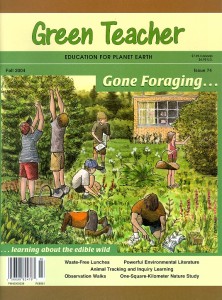Green Teacher 74, Fall 2004
 Features
Features
Environmental Education is a Must by David Suzuki
Guest editorialist David Suzuki argues that environmental education is more important than ever; as young people continue to be increasingly targeted by marketing campaigns, it is critical that they be also exposed to an ethic of conservation, not just consumption
Helping Students Go Feral by David Kowalewski
Through identifying and using wild plants as food, students acquire not only botanical theory but also hands-on experience in securing their own free nutrition and health care. David Kowalewski introduces readers to his highly successful undergraduate course “Wild Edible and Medicinal Plants”, explaining the rationale, course content and how he addresses the safety issues.
Literature and Environmental Studies by Louise Conn Fleming and Linda Webb Billman
Realistic fiction can connect students to the environment through powerful stories of real-life issues. This article suggests suitable fiction, for students in grades 6-8, that help to enhance units on prairies, forests, the Arctic, rivers and wetlands.
Waste-Free Lunches by Amy Hemmert
Parent and elementary school teacher, Amy Hemmert offers tips and suggestions for starting a waste-free lunch program at your school. Includes Web resources, and a guide to conducting a lunch trash audit.
Walking into Wonder by Cynthia Rothschild
Through observation walks, such as “sensory walks”, “human impact walks” “wildlife walks” or “mapping walks”, urban students discover the extraordinary in the ordinary and develop personal connections to the world around them
Teaming with Nature by Mark Baldwin
Developed by the Roger Tory Peterson Institute, “Teaming With Nature” is a place-based outdoor education program unit that shows educators how a one-square kilometre area around their school can be used as an open-air, real-life laboratory for the study of natural and human systems in their communities. Mark Baldwin describes how you can start such a program in your school or nature centre.
Inquiry-based Learning Through Animal Tracking by Mark D. Jordahl
Tracking engages every part of the brain – and reaches into every area of the curriculum. Mark Jodahl shows how tracking can inspire lots of good writing, math, music, art, science and computer literacy.
Science Libraries in the Classroom by Rebecca Grant
Having access to a comfortable classroom science library can turn kids on to science and reading at the same time. Rebecca Grant shares her experience slowly building up a science library in her middle school science classroom. The article also suggests “great picks for a science library” to help you get started.
The Song of Life Sings in Us All by Brian “Fox” Ellis
Celebrated children’s storyteller Brian “Fox” Ellis spent a weekend conference with a group of children aged 6 to 12, helping them create an animal action poem and skit that celebrated the web of life. He describes how you can use the same activity with your students.
And as always, over 20 new educational resources are profiled and evaluated in this issue of Green Teacher.
Leave a Reply
You must be logged in to post a comment.





